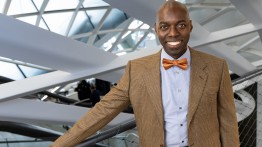Vice President of Academic Affairs

Photo by Leo Sorel
Dr. Demetrius L. Eudell is The Cooper Union’s first Vice President of Academic Affairs (VPAA). Dr. Eudell assumed his new role in July 2023, bringing to Cooper a wealth of scholarly experience as a historian and a deep educational commitment to the critical work at the core of Cooper’s disciplines and practices. Dr. Eudell was previously Dean of Social Sciences at Wesleyan University.
Dr. Eudell’s appointment as Vice President of Academic Affairs followed a national search process guided by the recommendations of an external Visiting Committee and involving a cross-section of Cooper Union faculty, students, and staff. The charge of the VPAA role, identified in the Committee’s report as an essential area of focus, is to coordinate cross-disciplinary learning opportunities, pedagogical collaboration, and global, civically engaged perspectives across the schools of architecture, art, engineering, and the faculty of the humanities and social sciences.




